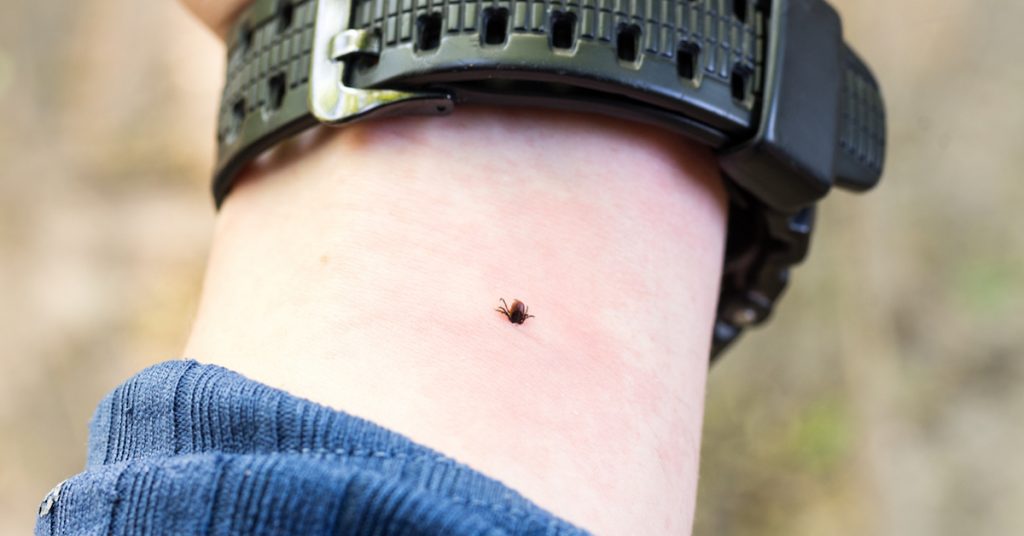
Although commonly found on dogs and cats, many species of fleas and ticks also feed on humans. For the most part, the bites of either insect result in mild symptoms that are mostly just annoying. In some cases, however, fleas and ticks carry dangerous diseases. The rat flea, for instance, is commonly blamed for the plague, and ticks sometimes transmit Lyme disease.
Flea Bite vs. Tick Bite Symptoms
When a tick bites, it attaches itself to the skin. Ticks should be removed carefully to avoid further complications such as contracting a potentially more infectious agent or by leaving the mouth portion of the tick attached to the skin. This can also become a source of infection. You may also want to save the tick in a sealed plastic bag, in case it’s needed for further diagnosis.
Tick bites on humans are rarely itchy. In fact, most people won’t notice anything other than some possible redness in the bite area. Nonetheless, tick bites can transmit a number of diseases. In addition to Lyme disease, tick bites transmit ehrlichiosis, Rocky Mountain Spotted Fever, and tularemia.
Unfortunately, many ticks are so small they can be difficult to detect. If you spend time outdoors, particularly in grassy or leafy areas, you should protect yourself from ticks by performing thorough daily inspections.
To protect against tick bites:
- Wear light-colored, protective clothing, including long pants tucked into socks
- Avoid tick-infested areas, such as fallen leaves and tall grass
- Use a tick repellent containing DEET, picaridin, or permethrin
- Inspect yourself, your pets, and your family members daily, and carefully remove ticks. Ensure that you are thoroughly looking between skin folds, under armpits and breasts, near scrotal folds, and behind ears.
Tick bites on humans often resemble a pimple. Unlike flea bites, tick bites are not itchy. Sometimes a red rash or bull’s eye forms around the area. If this happens, you should have the bite checked out by a FastMed healthcare provider, as this symptom can be a sign of Lyme disease or another illness.
Unlike tick bites, flea bites are itchy and often occur in groups, resembling tiny red bumps. Although less dangerous than tick bites, you could end up with an infection unless you refrain from scratching. If you do get an infection, you may require prescription medication.
The simplest way to avoid flea bites is to keep fleas away from your pets. Products like flea collars, flea shampoos, and oral medications can protect your pets, and ultimately you and your family members. You may also want to consider flea-control chemicals or an exterminator for your yard and home. When purchasing a flea repellent, look for one that contains a minimum of 10 to 30 percent DEET or a similar ingredient.
Tick Bite vs. Flea Bite Treatment
When treating flea and tick bites at home, you should thoroughly wash the area and your hands. In the case of a tick bite, you will need to carefully remove the tick first.
Using pointed tweezers, grasp the tick as close to the skin as possible, before pulling upward with a steady, even motion. Do not twist or jerk the tweezers.
If you develop a rash or fever in the weeks following a tick bite, see your healthcare provider. Explain when the bite occurred and where you were when you were bitten. This information will aid in a proper diagnosis.
For flea bite treatment, simply wash the bite area with soap and water, and apply calamine lotion to alleviate itching.
When to Get a Flea or Tick Bite Examined
Most flea and tick bites heal without further complications. If you get an infection from scratching a flea bite, or develop a rash or flu-like symptoms from a tick bite, you should have the bite examined by a medical provider.
Your local FastMed locations in Arizona, Texas, and North Carolina are open extended hours, 365 days a year, for quick, accurate diagnosis and treatment of bites. Walk in at your convenience. Or check in and register online before you arrive to save time.
About FastMed
FastMed is a leading provider of high-quality, convenient, affordable, and compassionate healthcare in 34 counties across North Carolina. FastMed serves both urban and rural communities across the state with a wide range of care options, including preventive, telemedicine, occupational health, and primary and urgent care. FastMed is one of the few urgent care providers in the nation that has earned The Joint Commission’s coveted Gold Seal of Approval® for quality, safety, and infection control in ambulatory healthcare. For more information, visit www.fastmed.com.